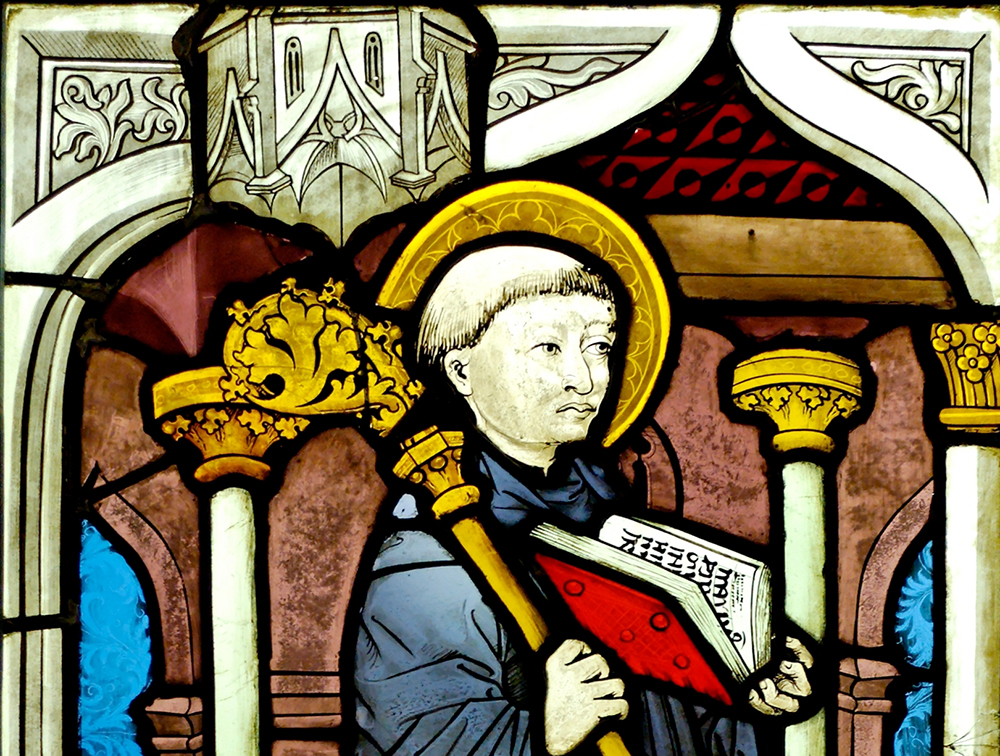‘Many of those who are humiliated are not humble.’
Regarded as the last of the Fathers of the Church, St. Bernard (1090-1153) is truly an ecclesial renaissance man. Infused with a profound intellect and renowned for his holiness, he bestowed a very rich doctrine and Gospel witness to the Church’s tradition. As an adept leader, he inaugurated reforms of monastic life in Europe and helped the Church navigate times of crisis.
Born to an aristocratic family, Bernard slowly made his way to monastic life. At 20, he entered the Cistercian order — a community of men founded in 1098 and dedicated to strict observance of St. Benedict’s ancient rule. It was not long before his leadership qualities became readily apparent. Within five years, his abbot sent him to establish a new foundation located at what is now called Clairvaux, France.
His influence over monastic life soon permeated Europe, not just concerning monastic living but in areas such as Church architecture. As his reputation for holiness spread, great numbers flocked to his monastery at Clairvaux, intent on learning from Bernard. With the witness and leadership of Bernard, the Cistercians soon were looked upon as a model for monastic life. As other monasteries worked to show the Cistercian way of life was too rigorous and demanding, Bernard vehemently defended their rule.
Bernard’s counsel was singled out frequently by many bishops and members of the hierarchy. He was called upon time and again to help settle various ecclesial disputes. Perhaps the most famous instance was in 1130 at a time of schism. Two men were claiming to have been elected pope. The antipope Anicletus II banished Innocent II from Rome, and the latter sought refuge in France. The king called together a council of the French bishops to settle the matter, and Bernard was summoned to identify the authentic pope. Through his persuasion, Europe’s ruling class came around to recognize Innocent II as pope, the candidate on whose behalf Bernard had argued.
Always an advocate for reform of the papacy, Bernard’s greatest chance to help the Church bring about such change came when one of his disciples was elected — Blessed Pope Eugene III in 1145. Although he did not initially support his candidacy, Bernard’s ecclesiastical influence grew even stronger under Eugene’s pontificate. Bernard obliged the Cistercian pope’s request for advice on reforming the papacy, a key theme that he argued was needed for the pope’s personal holiness.
Pope Eugene III commissioned Bernard to travel in Europe in 1146 to preach the second Crusade, and Bernard was successful in enlisting crusaders for the cause of protecting the Holy Land from Muslim possession. Bernard was not without critics, and when the Crusade failed miserably, many put the blame on him.
Numerous legends about Bernard’s personal virtues have survived the ages. He was so dedicated to chastity and resistance of temptations of the flesh that at times he would react with what might be considered by some as hyperbole.
His closeness to the Lord and his profound devotion to the Mother of God formed the heart of his preaching and teaching. Many popular prayers and devotions, such as the Memorare, that have stood the test of time are attributed to him. In recognition of the doctrinal and spiritual treasures he bequeathed to the Church, St. Bernard was named a Doctor of the Church in 1830 — called the “doctor of honey” for the sweet eloquence of his words.
Long suffering from ill health, particularly digestive complications, St. Bernard died at Clairvaux in 1153 and was canonized just over 20 years later. His feast is Aug. 20.
Michael R. Heinlein is editor of OSV’s Simply Catholic and a graduate of The Catholic University
of America. He writes from Indiana. This article is taken from the ‘Saints in Times of Crisis’ booklet from Our Sunday Visitor.

